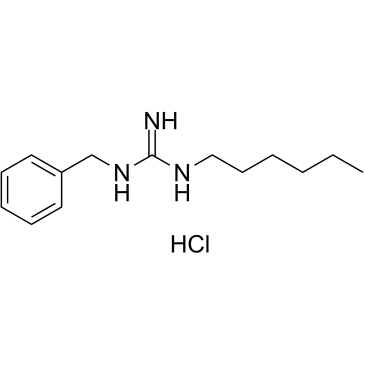
NS-3-008 HCl
CAS No. 1172854-54-4
NS-3-008 HCl ( —— )
产品货号. M21935 CAS No. 1172854-54-4
NS-3-008 HCl是一种转录G0/G1开关2 (G0s2)抑制剂(IC50为2.25 μM)。给予NS-3-008可抑制健康小鼠肝脏中G0s2的表达。
纯度: >98% (HPLC)
 COA
COA
 Datasheet
Datasheet
 HNMR
HNMR
 HPLC
HPLC
 MSDS
MSDS
 Handing Instructions
Handing Instructions
| 规格 | 价格/人民币 | 库存 | 数量 |
| 2MG | ¥324 | 有现货 |


|
| 5MG | ¥518 | 有现货 |


|
| 10MG | ¥786 | 有现货 |


|
| 25MG | ¥1426 | 有现货 |


|
| 50MG | ¥2398 | 有现货 |


|
| 100MG | ¥3588 | 有现货 |


|
| 200MG | 获取报价 | 有现货 |


|
| 500MG | 获取报价 | 有现货 |


|
| 1G | 获取报价 | 有现货 |


|
生物学信息
-
产品名称NS-3-008 HCl
-
注意事项本公司产品仅用于科研实验,不得用于人体或动物的临床与诊断
-
产品简述NS-3-008 HCl是一种转录G0/G1开关2 (G0s2)抑制剂(IC50为2.25 μM)。给予NS-3-008可抑制健康小鼠肝脏中G0s2的表达。
-
产品描述NS-3-008 HCl is a transcriptional G0/G1 switch 2 (G0s2) inhibitor( IC50 of 2.25 μM).Administration of NS-3-008 inhibited the expression of G0s2 in healthy mice liver.?In contrast, administration of NS-3-008 did not affect the MBP in wild-type sham and 5/6Nx mice.?NS-3-008 as a novel G0s2 inhibitor and showed that administration of this inhibitor ameliorated renal dysfunction in wild-type 5/6Nx mice.
-
体外实验NS-3-008 binds to Hsd17b4; knockdown of Hsd17b4 decreased G0s2 mRNA levels, whereas overexpression of Hsd17b4 induced G0s2 mRNA expression. The inhibitory effects of NS-3-008 are blocked by knockdown of Hsd17b4 or deletion of the Stat5 binding site in the G0s2 promoter. NS-3-008 decreases the nuclear phosphorylation of Stat5.
-
体内实验NS-3-008 (5 mg/kg; oral administration; daily; for 4 weeks; wild-type 5/6Nx mice) treatment results in decreased levels of G0s2 and Ccl2 mRNA in the kidneys. The phosphorylation of Stat5 and p65 protein is decreased, and SUN concentrations and renal caspase 3/7 activity decreased in 5/6Nx mice treated with NS-03-08. The F4/80-positive area and F4/80 protein levels are decreased in 5/6Nx mice treated with NS-3-008.
-
同义词——
-
通路Others
-
靶点Other Targets
-
受体G0s2
-
研究领域——
-
适应症——
化学信息
-
CAS Number1172854-54-4
-
分子量269.81
-
分子式C14H24ClN3
-
纯度>98% (HPLC)
-
溶解度DMSO:120 mg/ml(444.76 mM; Need ultrasonic);H2O : 125 mg/mL (463.29 mM; Need ultrasonic)
-
SMILESCl.CCCCCCNC(=N)NCc1ccccc1
-
化学全称——
运输与储存
-
储存条件(-20℃)
-
运输条件With Ice Pack
-
稳定性≥ 2 years
参考文献
1.Matsunaga N, et al. Inhibition of G0/G1 Switch 2 Ameliorates Renal Inflammation in Chronic Kidney Disease. EBioMedicine. 2016 Nov;13:262-273.
产品手册




关联产品
-
Neuropathiazol
Neuropathiazol 是一种神经元分化诱导物,能选择性地诱导多能海马神经祖细胞神经元分化。
-
Tetrahydroswertianol...
Tetrahydroswertianolin
-
Saprisartan
Saprisartan 是一种 AT1 受体拮抗剂。它是基于氯沙坦原型化学结构的化合物。



 021-51111890
021-51111890 购物车()
购物车()
 sales@molnova.cn
sales@molnova.cn







